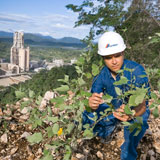Comunicados
CEMEX in Costa Rica uses rice husks and wood chips as fuels for its cement production
CEMEX in Costa Rica has successfully implemented a United Nations-certified Clean Development Mechanism (CDM) that substitutes conventional fossil fuels such as petroleum coke, fuel oil, and natural gas with more environmentally friendly local biomass products such as rice husks and wood chips.

The biomasses are now used in cement kilns to serve as fuel during calcination, an important component of the cement-making process in which raw materials are heated to temperatures of nearly 1,500 degrees Celsius. Reaching these extreme temperatures takes an incredible amount of energy, making alternatives to fossil fuels a crucial part of CEMEX’s strategy to reduce its environmental footprint.
CEMEX’s Costa Rican operations currently have a 20% alternative fuels substitution rate and this project alone helped avoid 21,000 metric tons of CO2 from being emitted on a yearly basis, equivalent to taking 7,000 cars off the roads for an entire year, equivalent to approximately the number of passenger vehicles in a mid-size city in Costa Rica.
The use of alternative fuels is a crucial part of CEMEX’s energy strategy. On a global basis we substantially increased the use of alternative fuels from 10.3% in 2008 to 16.4% in 2009. We have already exceeded our 2015 target, and remain on track to reach our 2020 target of 23%.
This initiative in Costa Rica is part of our global energy strategy and highlights CEMEX’s commitment to both Operational Efficiency and Sustainable Development.
